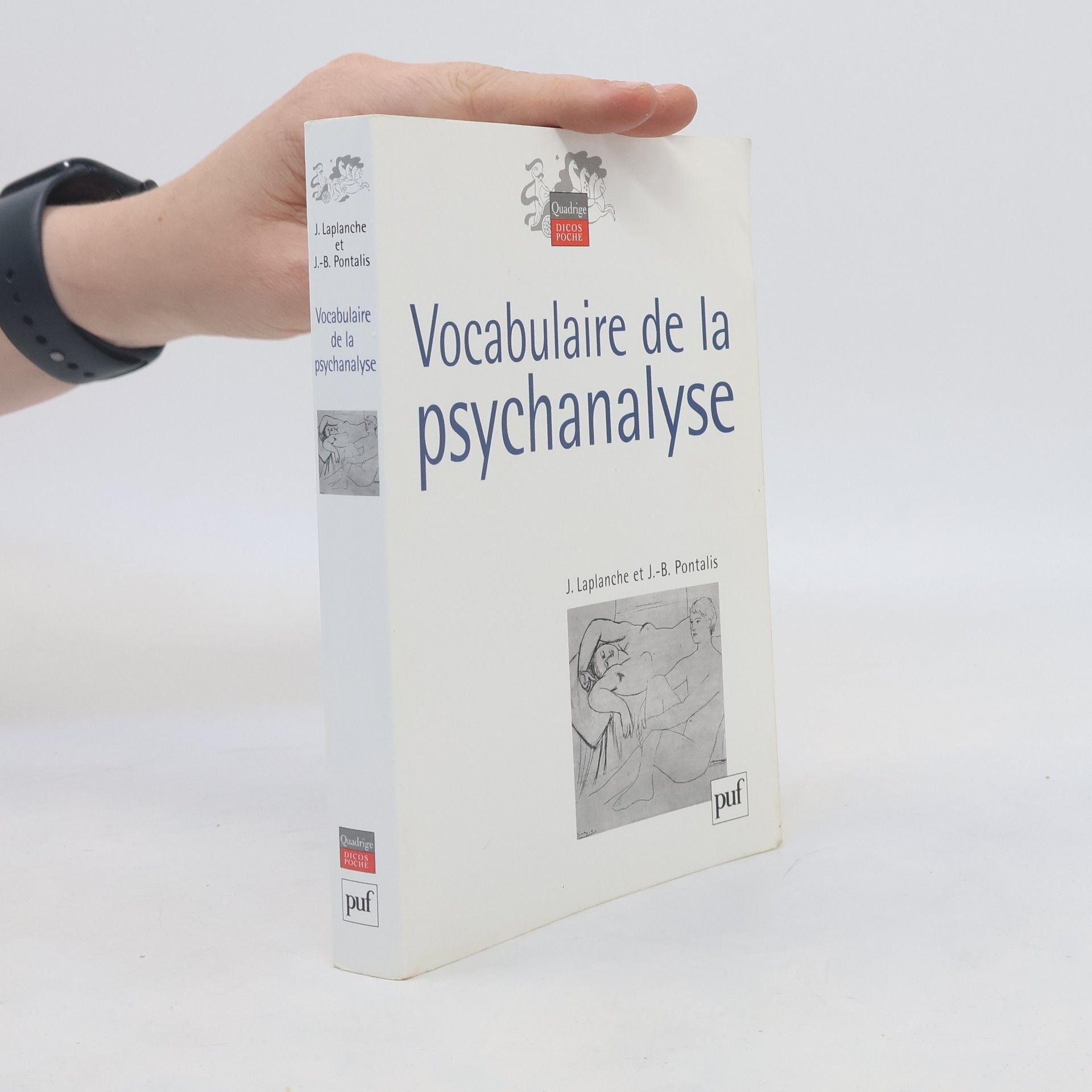" Au-delà d'une simple recension des " vocables " psychanalytiques, ce Vocabulaire propose une réflexion, allant du plus simple au plus complexe, sur l'ensemble des concepts que Freud et d'autres à sa suite ont progressivement élaborés, pour rendre compte des découvertes de la psychanalyse. Notre commentaire a tenté, à propos des notions principales qu'il rencontrait, d'en lever ou tout au moins d'en éclairer les ambiguïtés, d'en expliciter les éventuelles contradictions. Il est rare que celles-ci ne débouchent pas sur une problématique susceptible d'être retrouvée dans l'expérience même. " (J. Laplanche, J. -B. Pontalis). Ce Vocabulaire, fut publié pour la première fois en 1967 dans une version reliée, puis repris dans la collection Quadrige et son succès, tant en France (plus de 100 000 exemplaires vendus) qu'à l'étranger (des éditions en dix-sept langues, de l'anglais au japonais, du suédois au turc et à l'arabe) ne s'est jamais démenti, preuve de la pertinence de ce travail " encore bien présent, même s'il serait améliorable. Il ne s'agissait pas de faire le tour de Freud mais de lancer des coups de sonde, d'approfondissement. Le contraire même d'une mise en manuel : une mise en problème " selon les termes de J. Laplanche. ressivement élaborés pour rendre compte des découvertes de la psychanalyse. Avec un index français et allemand des concepts analysés.
Jean Laplanche Livres
Jean Laplanche fut un psychanalyste français dont l'œuvre fut profondément nourrie par l'interrogation philosophique. Ses premières études auprès de penseurs éminents ont façonné sa compréhension profonde de l'esprit humain. Il poursuivit ensuite sa formation et sa cure analytique auprès de Jacques Lacan, affinant davantage son approche théorique. Les contributions de Laplanche l'ont établi comme une figure marquante, faisant le pont entre la pensée philosophique et la pratique psychanalytique.






Focusing on the intersection of biology and sexuality, this major monograph delves into Freud's theories and critiques the biologizing tendencies in understanding human sexuality. Laplanche examines the implications of these ideas for psychoanalysis and offers a nuanced perspective on sexual development and identity. Originally published in 1987 and later republished, the work reflects significant developments in Laplanche's thought, making it a pivotal text for those interested in psychoanalytic theory and sexual discourse.
Essays on Otherness
- 288pages
- 11 heures de lecture
Highlighting the concept of "otherness," this collection features key essays by Laplanche, now available in English for the first time. It offers a comprehensive overview of his influential ideas, making it an essential resource for understanding his contributions to psychoanalysis and philosophy.
Winner of the Prix Femina and considered a masterpiece of autobiography, this is J. B. Pontalis' lyrical meditation on his own life. One of France's pre- eminent psychoanalysts, he is co-author of the classic The Language of Psychoanalysis and he has also been a member of the editorial committee of Les Temps Modernes.
At once a memoir and a personal version of the author's highly influential Language of Psychoanalysis, this title offers an autobiographical perspective on the private vocabularies that develop between analyst and patient.
For this volume Jean Laplanche selected his principal writings from 1992 to 1998, a period in which he demonstrated the power and range of his psychoanalytic and philosophical inquiry, including his 'return to Freud' and his General Theory of Seduction. Some of the essays are here published in English translation for the first time. Forty years after his masterful translation of Laplanche's Life and Death in Psychoanalysis, Jeffrey Mehlman once again provides an elegant and insightful translation, which preserves the clarity and rigor of Laplanche's essays.
Freud and the Sexual
- 352pages
- 13 heures de lecture
Challenging conventional interpretations, this work by Jean Laplanche delves into the complexities of Freud's theories on sexuality. Laplanche contends that Freud's ideas have been oversimplified, revealing a richer and more nuanced understanding of sexuality than typically acknowledged. Through this exploration, the author seeks to clarify and expand upon Freud's original concepts, offering fresh insights into psychoanalytic theory and its implications for understanding human sexuality.
Focusing on the intellectual evolution of Jean Laplanche, this work highlights a pivotal five-year period beginning in 1987, marked by his seminal text New Foundations for Psychoanalysis. During this time, he developed key concepts through various seminars, including the exploration of après-coup and critiques of Freud's biological interpretations of sexuality. The text encapsulates Laplanche's innovative contributions to psychoanalytic theory, showcasing his profound impact on the field and the ongoing dialogue surrounding Freud's legacy.
New Foundations for Psychoanalysis
- 214pages
- 8 heures de lecture
The book highlights a pivotal five-year period in Laplanche's intellectual journey, beginning with the release of New Foundations for Psychoanalysis in 1987. During this time, he developed key concepts that shaped his theories, alongside significant seminars that explored intricate topics such as après-coup and Freud's theories on sexuality. These works, including Problématiques VI and VII, showcase Laplanche's critical engagement with psychoanalytic thought and his innovative contributions to understanding human sexuality and its biological implications.
Après-coup
followed by Time and the Other and Temporality and Translation & Debate on "Temporality and Translation"
- 300pages
- 11 heures de lecture
The lectures from the 1989-90 seminar on après-coup showcase Laplanche's significant contributions to psychoanalysis during a peak of his creative output. This volume completes the English translations of his major works, alongside two additional essays, "Time and the Other" and "Temporality and Translation," also translated by Luke Thurston. These texts delve into complex themes of temporality and the interplay of translation within psychoanalytic theory, enriching the understanding of Laplanche's innovative ideas.